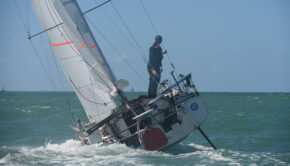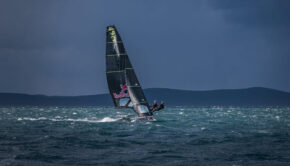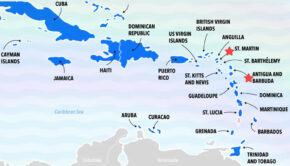Door closes for Jules Verne Trophy
Published on January 31st, 2022
Dona Bertarelli, Yann Guichard, and their team have ended their standby period for a fourth attempt at the Jules Verne Trophy around-the-world sailing record. The team has been ready to tackle the record since November 1, but there has not been a suitable weather window for the crew of the maxi trimaran Sails of Change (ex-Spindrift 2) to set sail with a realistic chance of beating the record.
With limitations within weather forecasting, it is key to maximize the team’s chances during the first section of the route for any hope to beat the around-the-world record under sail. The primary challenge is to make a very fast passage from the island of Ushant to the equator (within the record time of 4 days 19 hours and 57 minutes set by Spindrift 2 herself in 2019).
The crew would then need to make the southern tip of Africa in under 12 days, to be level with the previous record. With this in mind, since November 1, Guichard (skipper), Benjamin Schwartz (navigator) and Jean-Yves Bernot (onshore router) have been analyzing the weather in a bid to pinpoint the perfect configuration for linking these two sequences together.
However, over the winter, the weather scenario has not once been favorable for starting the attempt in hopes of bettering the record held since 2017 by Francis Joyon and his crew in a time of 40d 23h30m 30s.
“For some weeks, the low-pressure systems rolling towards Europe have been positioned a long way south, around the Canaries, Madeira and to the south of the Azores,” explained Bernot. “Such a weather configuration prevents the trade wind from being strong and becoming established longer term.
“Usually, such episodes are fleeting, only lasting a few days at best. However, this year, the cycle has been on constant repeat. This has resulted in large areas of light breeze from the south of Gibraltar as far as Cape Verde. Of course, this is not at all conducive for setting sail on a round the world record.
“At the same time, in the South Atlantic, the Saint Helena High was extensive at the start of standby, making it difficult to negotiate due to the numerous windless areas. For Sails of Change, there was a very real risk of getting stuck there.”
In light of this situation, at the beginning of January, the team decided to extend the period of standby by two weeks until January 31. During this time, the weather situation has remained unchanged and the forecasts for early February are not optimistic.
Bernot also points out that a late entry into the Deep South is not recommended. “The austral summer is gradually drawing to a close,” notes Bernot. “Sailing conditions in this area are becoming increasingly complicated with the cold, the gales, and very heavy seas. With too much bad weather comes the increased risk of suffering damage, and it is more difficult to maintain the high average speeds needed to break the record”.
Within this context, Bertarelli Yann Guichard have decided to call off their team’s standby for the Jules Verne Trophy record and look toward a 2022-23 attempt.
“For the past two years, the team has done a remarkable job optimizing our maxi-trimaran Sails of Change,” said Guichard. “The boat has never been so well prepared to break this record and that’s something we can be proud of.”
In addition to pursuing the record, the boat was reconfigured to produce all their energy requirements self-sufficiently, which would have been the first time the whole journey would have been undertaken with no auxiliary engine. Their main sources of energy would come from the sun and wind, as well as an on-board bike-powered generator.
This new energy challenge accompanies a series of technical solutions introduced over the winter, which relate to the cockpit, aerodynamics and central hull, the latter having been shortened by three metres. This latest modification provides improved balance at the helm and reduces vibration aboard the largest racing multihull ever built (37 metres).
“Of course, it’s disappointing not to be setting sail,” noted Guichard. “We switched to code green twice, but unfortunately the weather windows promptly closed up again. The routing subsequently confirmed that we’d made the right decision not to leave, so we have no regrets.
“I greatly appreciate that the entire team has been mobilized and at the ready for the last three months, especially the sailors, who remained their high levels of motivation. We’re lucky to have a fantastic team and a boat which is designed for the Jules Verne Trophy.”
Bertarelli adds, “We are about to unveil the sports program for our team for the year ahead. Through our various projects, we’re keen to continue being the standard-bearer for the “30×30” campaign, which aims to protect 30% of our planet by 2030.
“Our aim is to raise awareness among the general public and institutions to promote the additional commitments which governments around the world need to make. At the same time, we’re extending our efforts with students through our ‘Spindrift for Schools’ program, which aims to raise awareness among young people.”.
Details: https://spindrift-racing.com/
The team’s 2021-22 effort had included ten sailors with complementary backgrounds, five of whom had already circumnavigated the globe, to set sail alongside skipper Yann Guichard on this fourth crewed attempt. Two of them, Thierry Chabagny and Xavier Revil, won the Jules Verne Trophy in 2012, whilst Dona Bertarelli has held the title of fastest woman to sail around the world since 2016.
In all, nine of the eleven sailors had previously been involved in a Jules Verne Trophy attempt. Only Julien Villion and Yann Jauvin would have been making their Trophy debut in this legendary international offshore racing event.
2021-22 crew on the maxi-trimaran Sails of Change
Yann Guichard – skipper
Dona Bertarelli – on-board reporter
Benjamin Schwartz – navigator
Jacques Guichard – Watch leader
Xavier Revil – Watch leader
Jackson Bouttell – Watch leader, bowman
Duncan Späth – sailor
Thierry Chabagny – sailor
Gregory Gendron – sailor
Julien Villion – sailor
Yann Jauvin – sailor, bowman
Jean-Yves Bernot – onshore router
The Jules Verne Trophy is the crewed, unassisted, round the world record under sail. In less than 30 years, the reference time has been halved, from 79d 06h 16’ in 1993 to 40d 23h 30’ in 2017.
Spindrift has made three previous attempts at breaking the record, posting the third best time in history in 2016 and securing the record between Ushant and the equator in 2019. The team has been on standby since November 1.
To put into perspective how difficult it is to win the Jules Verne Trophy, it’s worth noting that out of thirty-three departures off Ushant, just nine of these round the world attempts under sail have been successful:
• Commodore-Explorer in 1993 (79d 06h 16’)
• Enza-New Zealand in 1994 (74d 22h 17′)
• Sport-Elec in 1997 (71d 14h 22′), Orange in 2002 (64d 08h 37′)
• Geronimo in 2004 (63d 13h 59′)
• Orange II in 2005 (50d 16h 20′)
• Groupama 3 in 2010 (48d 07h 45′)
• Banque Populaire V in 2012 (45d 13h 43′)
• Idec-Sport in 2017 (40d 23h 30′)
Intermediate Crewed Reference Times:
Ushant-equator: 4d 20h 07’ (Spindrift 2 in 2019)
Equator-Agulhas Cape: 6d 08h 55’ (Banque Populaire V in 2012)
Agulhas Cape-Cape Leeuwin: 4d 09h 32’ (IDEC Sport in 2017)
Cape Leeuwin-Cape Horn: 9d 08h 46’ (IDEC Sport in 2017)
Cape Horn-Equator: 7d 04h 27’ (Banque Populaire V in 2012)
Equator-Ushant: 5d 19h 21’ (IDEC Sport in 2017)
Crewed Records listed by World Sailing Speed Record Council:
North Atlantic crossing (Ushant-Equator): 4d 20h 07’ (Spindrift 2 in 2019)
Indian Ocean crossing (Agulhas Cape-South Tasmania): 5d 21h 07’ 45’’ (IDEC Sport in 2017)
Pacific Ocean crossing (South Tasmania-Cape Horn): 7d 21h 13’ 31’’ (IDEC Sport in 2017)
Equator-Equator: 29d 09h 10’ 55’’ (IDEC Sport in 2017)
Round the world (Jules Verne Trophy): 40d 23h 30’ 30’’ (IDEC Sport in 2017)
Source: Spindrift Racing









 We’ll keep your information safe.
We’ll keep your information safe.